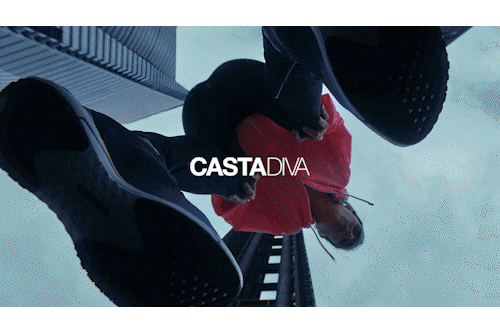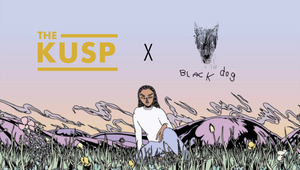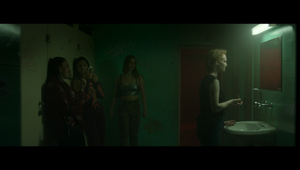
Script Writing Stars on the Rise: Get to Know London’s Next Generation of Wordsmiths

The city of London is a colourful hotbed of opportunity, ready-made talent, and in-your-face energy– the perfect place to immerse yourself in creative ambition. For these young creatives, their relentless pursuit of shaping the future of advertising has led them to working alongside the best in the business in script writing roles at The&Partnership, adam&eveDDB, Creature London and BBH London. LBB speaks to each of them about the journey thus far, touching on the work that has made the biggest impact to them personally and professionally, and the driving force behind the fierce ambition that fuels them.
LBB’s Uprising channel is brought to you in partnership with Ridley Scott Creative Group in ongoing efforts to facilitate opportunities for the next generation of creative talent. The Uprising channel amplifies the voices of emerging talent in the industry, and with the support of Ridley Scott Creative Group, the industry’s top talent will have an even louder voice on LBB’s global platform. The channel is an opportunity for up-and-coming talent to be celebrated for their artistry, personality, and inspirations, with each feature exploring their creative background, niche craft obsessions, the work they are most proud of, and views on the state of the industry.
Adam Jackson and Ted Price
Script writing

LBB> How and when did you realise you wanted to be creative?
Growing up we were both arty kids that loved drawing and making things. I initially wanted to be an artist and Adam wanted to design exhibitions. It wasn’t until we went to university that we realised advertising was a thing. It was then that we began to envision a direction in which we could channel this “creativity.”
We didn’t end up on a traditional ad course but one of the great things about our course was we got a chance to do everything; graphics, typography, logo design, animation, life drawing, photography, screen printing, film making, book making, the list goes on! We didn’t know it at the time, but this was a great introduction to advertising because, of course, ads go far beyond posters and TV.
LBB> How did you get your start in the industry?
After graduating we spent the best part of eight months getting our book critiqued. Ted stayed in the spare room at my parents' house so we could commute into London every week to work on our book. Our first whiff of a placement was with Yan Elliott who we went for a chat with at Lucky Generals. Naively, we left behind a mug with our mugs on, to remember us by. One day his emails stopped coming and we thought all was lost. Next thing we know, he’s jumped to T&P and wants us to meet the master of placements, Angus Vine. Needless to say the rest is history and we’ve been here for nearly six years now.
LBB> What are the most significant projects you’ve worked on?
It has to be the first ad we produced here: Jaffa Whaaaaat? Featuring a ginger goat and Joey Essex, and directed by Jack Clough of People Just Do Nothing fame. To this day it’s the most fun we’ve had on a project. Nothing beats something you’ve scribbled down in a notebook coming to life in front of your eyes. The tension of waiting for a goat to bleet on cue will stay with us – Smartie the goat was a 10/10 cast member.
LBB> What do you find particularly interesting about script writing for the advertising industry?
The fact there really is no right or wrong way. Every brief demands a different way into the process – you’re reinventing your style, your craft and the way you put words together. For our latest project with RNIB ‘See The Person’, it was a completely different process, as we had to convey the thoughts and feelings of someone who was losing their sight. We took over a tiny room in the agency and drew a timeline on the wall. It was littered with different scenes, depicting how our character was behaving, their likes and dislikes. Right up until the end of the project, we were writing, shaping and forming slightly different versions of the story. It’s only when you hear the word out loud that you know you’ve cracked it.
Flora McConnell and River Borromeo
Script writing

LBB> How and when did you realise you wanted to be a creative?
Flora> While other children were watching 'Tracy Beaker', I was religiously watching the John Lewis Christmas ads – I found them captivating, counting down to the new one every November. I always wondered how I could become ‘the person who comes up with the idea’. Turns out that job does have a name: it's called being a creative.
River> I had the choice between two careers; one in law and one as a writer. After a brief work experience stint in a dinghy office in Woolwich, spending mornings copying and pasting peoples names on to eviction notices, I decided law wasn’t for me, so I decided to study creative writing at university.
LBB> How did you get your start in the industry?
Flora> We were in Tony Cullingham’s final batch at the Watford Course, and so we were trained the hard way. Tony taught us that there’s only one way to get into the industry: graft and persistence. We spent months talking to Lloyd Daniel, a creative we admired at Neverland, and eventually got in there. We got hired full-time after two weeks, which was a crazy whirlwind that we never expected, but it launched us into being junior creatives. We learned so much by working on huge brands such as Kopparberg, Getir and Ladbrokes so early on.
We’ve since moved on to Creature London, where we’ve been for just over a year. It’s amazing how much you can learn in such a short period of time, especially with such great creative directors guiding the way.
LBB> What are some of the most significant projects you’ve worked on?
River> Definitely our work for Dunelm, one of the UKs biggest homeware retailers. We even ended up attracting a BAFTA winning director for it!
Flora> The brand wanted to be there for people when times are tough, so we came up with the fictional world of Wits’ End, a place where everything is a bit… all over the place. Where it rains underneath umbrellas. Postboxes spit out letters. People wash their cars with dirt. The saving grace for the residents of Wits’ End is their ability to escape the weird world outside with a home that makes sense, with Dunelm.
LBB> What do you find particularly interesting about script writing for the advertising industry?
River> Coming up with the first round of scripts is always fun because there’s endless possibilities with what direction you can take a concept. But in advertising it’s more than just that. At the end of the day, a brand has to buy into it. That’s probably what we’ve found the most interesting – juggling all the different components of a script to make great work.
Flora> It’s a real skill, and it’s one that we’re honing, but we find being hybrid creatives who love both writing copy and art direction really helpful in that. We write in completely different ways, which means we cover even more ground when it comes to writing scripts.
Katy David
Script writing

LBB> How and when did you realise you wanted to be a creative?
Katy> When I left school, I wasn’t sure what I wanted to do with my life. All I did know was that I got bored very easily so it had to be something I was passionate about. I soldiered on with my history degree, which made me realise that I loved approaching old stories from an original angle.
It was my Mum who first mentioned the world of advertising but I didn’t think I had the skills to be a creative – I thought photoshop was a place where you got photos printed. Instead, I began looking at account management and I was advised to start there as a way of seeing the advertising process through, from start to finish.
About a year and a half of account manning to my heart’s content, I had a very timely quarter-life crisis. I realised that the only person saying I didn’t have what it took to be a creative, was me. This seemed like a terrible reason not to try. I looked holistically at my career trajectory and decided there was no point climbing the ladder if I’m on the wrong wall.
So I did what any sane person would do. I turned to theft. I stole any brief I could get my hands on and just put pen to paper. Suffice to say, I had no clue what I was doing but I’d be writing into the early hours of the morning. The creative directors at the agency were kind enough to lend their time, encouragement and wisdom, only fuelling my hunger for more.
LBB> How did you get your start in the industry?
Katy> After months of relentless inbox badgering, I secured a one-month account management internship at my first agency which led to another until I gained my first job as an account executive.
When it came to switching to creative, my creative directors told me about ad school opportunities. Despite a one year delay due to covid, I managed to secure a place on the Barn ad school, Tony Cullingham’s new venture with BBH. It only took 250 pages of work and three interviews…
It was on this course that I met my current art director, Sim, a kindred spirit who packed in a promising architecture career to become a creative. We both had a lot to prove and her buckets of talent made partnering up a no brainer.
LBB> What do you find particularly interesting about scriptwriting for the advertising industry?
Katy> One of the most important things that I’m still grappling with is the length of advertising scripts. There’s little time to be indulgent when you’ve got to convey a message in 15 seconds. Scripts are getting shorter by the day, as brands prioritise social and digital platforms. With attention spans shrinking, the challenge for writers has become even greater. Just like a snappy headline, I love telling stories in the shortest and most unique way possible.
One particular area I’m keen to write more of is comedy. I know what you’re thinking, “surely she can’t be serious?” I am, and don’t call me Shirley. Having grown up on the likes of 'Airplane', 'Blackadder' and 'Monty Python' (thanks Dad), I’m always looking to add a dark and twisted joke in any script. An ad of late that springs to mind is the Twix ‘Camping’ ad - Simple, succinct and hilarious. I’m chuffed to be in a career that could make the world funnier if it so wished. I certainly do.
Jay Parekh and Forrest Clancy
adam&eveDDB
Script writing

LBB> How and when did you realise you wanted to be a creative?
Jay> I’ve always been a bit of a creative sponge. I studied architecture at university where I learnt a lot about the creative process. I then worked in contemporary art for a year. But I felt both environments were limiting in different ways. It’s embarrassing to admit but I found out what an advertising creative is from watching 'Mad Men'. Many aspects of the role appealed to me: working across different mediums, the pace of projects, coming up with ideas, and actually having the resources to fulfil those ideas – so I thought I’d give it a try.
Forrest> Mine’s even more embarrassing... I’ve wanted to be an advertising creative since I was about 16. I used to sit in my bedroom every night, not doing my homework, instead just watching ads again, and again, and again. One day it just clicked in my head that there was this thing called a job, where you do stuff, and of those jobs was the one where you make the ads I’ve been watching all this time. That seemed cool to me. But probably only me. Nobody has ever told me that my teenage obsession with ads was cool.
LBB> How did you get your start in the industry?
We both went to the School of Communication Arts 2.0 where we collectively won Black, White, Yellow and two Graphite D&AD New Blood Pencils, as well as ADCE Young Creative of the Year. We teamed up in lockdown, which was a lonely time for single creatives, both romantically and professionally. We met online, went on a few dates, and then as we built some momentum, we decided to make a portfolio together and announce ourselves to the advertising world.
After a chance zoom meeting with Rick Brim, we were introduced, again on zoom, to ECDs Ant Nelson and Mike Sutherland, before setting up an in-person meeting with them. In the interim, we made the mistake of looking up their work, so by the time we met up with Ant and Mike, we were like a couple of nervous kids.
We absolutely bottled our meeting with them. But apparently they saw something in us, because they offered us a place at adam&eve, and have been our mentors ever since, which has been an invaluable learning experience.
LBB> What are some of the most significant projects you’ve worked on?
The most significant project we’ve worked on has to be the 2022 National Lottery campaign 'A Christmas Love Story', directed by Tom Hooper (The King’s Speech).
We heard about the brief from our ECD Ben Tollett, who told us it was a good opportunity and that we should take a look if we get a chance.
We were working on it unofficially when we had an idea we knew was a gem, so one day, when we saw the creative review happening across the floor, we literally ambushed it and demanded that we read our script to the room. Everyone fell in love with it on the spot, as did the clients when it was presented a week later.
And so, 18 months into our careers, we found ourselves making one of the biggest ads in the agency, with an Academy Award-winning director.
The project was an incredible experience, and we learnt so much at every stage: working through the intricacies of quite a complicated script, watching Tom create magic on the shoot, and getting into the nitty gritties of the edit room. We feel very fortunate to have worked with all the wonderfully talented people that we did.
LBB> What do you find particularly interesting about script writing for the advertising industry?
What we really appreciate about script writing is its accessibility: 99.9% of the time, it’s not about lengthy prose or big words, it’s about communicating the idea as simply and succinctly as possible, so that whoever reads it gets it, and gets it fast.
One of the most enjoyable, but also the most challenging parts of the job is how often you have to evolve. To make an entertaining story you have to build something that has as many moving parts as possible, all of which are working together. It’s like engineering a Swiss watch. There are times where this requires process, and there are times where we just throw everything, including ourselves, at the wall. Ultimately, it’s difficult writing that makes for easy reading.
You get to make up all these little stories, scenarios, characters and worlds, everyday. And more often than not, they won’t get made in real life, but they are made in your mind’s eye, and there are no limitations like budgets there. You become the director and you can see these stories so clearly and vividly. But then every so often, something you write does get made, and you get to see it through an entirely different lens. You get to see into the mind of someone else – it’s a privilege.















